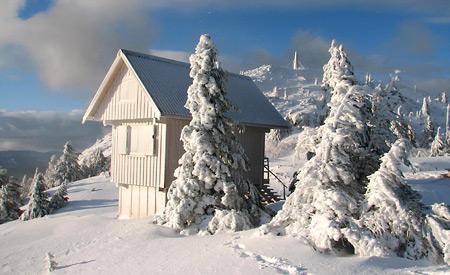Emergency services personnel rescued two teenagers from the Tin Hat area early Sunday morning, January 13.
The youth were snowshoeing to the new Tin Hat mountain cabin when they became lost, said Laurence Edwards, Powell River Search and Rescue Society president. Five members of the society were called out at 8 pm on Saturday, January 12 and headed out to Tin Hat on snowshoes. They arrived at the location where the youths were at the same time as a Cormorant helicopter from 19 Wing Comox, part of Royal Canadian Air Force 442 Transport and Rescue Squadron.
“They dropped a technician down as we reached there at the same time,” Edwards said. “The two subjects were lifted into the helicopter, along with the five rescuers. We were all flown back to the airport.”
The helicopter had been dispatched from 19 Wing at 1:13 am and arrived in the search area, approximately 16 kilometres northeast of Powell River and south of Powell Lake, a short time later.
Powell River search and rescue had requested support from the Canadian Forces and at the time of the call for assistance, SAR members had located the lost snowshoers, but had not yet reached them. According to a news release from 19 Wing public affairs, “communication between the Cormorant crew and the [SAR] team was excellent and they were accurate and effective in helping to guide the Cormorant crew to the rescue site.”
Operating at roughly 1,100 metres altitude, the Cormorant lowered SAR technicians to extract the snowshoers. “There was deep snow and a heavy snow load in the trees at the rescue site, which was blown around by the helicopter downwash,” said Captain Luc Cotes, first officer of the Cormorant. “During the extraction, it was like operating in a snowball.”
The helicopter flew the teenagers and SAR team members back to Powell River airport, arriving at about 2:45 am. The Cormorant returned to 19 Wing by 3:30 am.
The youths, both males, were cold and tired, Edwards said, but they didn’t sustain any injuries. BC Ambulance Service met the helicopter at the airport and took the teenagers to Powell River General Hospital. “Basically, they were exhausted and very, very cold,” Edwards said. “It was good that we got there and it was good that 442 pulled us out. It was very fortunate for the two that they didn’t have to spend the night there.”
It was also good that the two youths had a cell phone, Edwards said. They called one of their parents and “were able to say they were in difficulty.”
The parent raised the alarm, Edwards said. “The problem was they were expecting to stay the night in the cabin,” he said. “If they’d had to stay the night out in the open like they were, they would have been in very serious trouble. It was approximately minus 10 up there.”
The teenagers had sleeping bags and food, but they weren’t appropriately dressed, Edwards said. “Sleeping bags in the snow are not very good,” he said. “It’s fortunate everything worked out very well.”
Rescuers were able to keep in contact with the youth while they were on the mountain, Edwards added. “We were able to ask them where they had actually gone,” he said.
The rescue is a good reminder to people to be prepared when they go out in the wilderness, Edwards said.
Andy Evans, one of SAR team who helped rescue the teenagers, agreed. “They weren’t prepared for where they were and under-prepared for the conditions,” he said. “They were underdressed.”
Sunday’s incident is the third major rescue for Powell River SAR in the past six months. The team helped rescue an injured hiker from the Centre Lakes area at the end of July and located a woman and her baby who became lost while picking mushrooms in the Duck Lake area in October.



